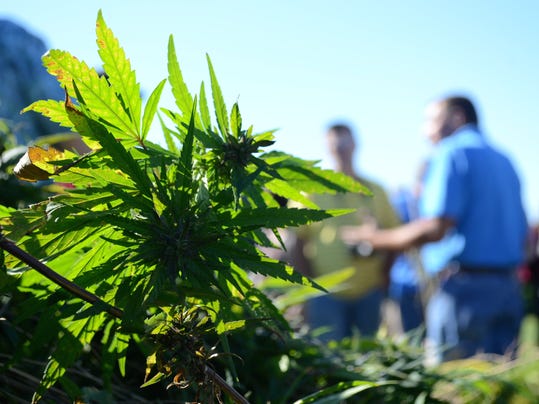Source: indystar.com

A bill that would have allowed farmers to grow a type of low-THC cannabis hit a roadblock Thursday after Gov. Eric Holcomb raised questions about the state's readiness to regulate the industry.
The Senate voted to strip the bill and instead only study the possibility of legalizing the plant — a move the governor requested, according to House Speaker Brian Bosma.
"The governor is not opposed to the idea of industrial hemp in Indiana," said Stephanie Wilson, spokeswoman for Holcomb. "But, he thinks if we do it, we need to make sure we do it right. That's why a summer study committee is the best decision."
House Bill 1137 would have allowed the growth and manufacturing of products made from industrial hemp — marijuana's non-psychedelic cousin that can't produce a high and contains less than .3 percent THC.
The product could be used to make fiber, low-THC cannabidiol oil or pressed seed oil.
The bill passed unanimously in the House, but met more push back in the Senate Commerce and Technology committee before being amended into a study committee bill on the full Senate floor by a voice vote.
Typically the Senate is the more conservative chamber on issues related to medical marijuana. While the House voted to pass a resolution to study medical marijuana in an interim committee, Senate Leader David Long said the Senate wasn't going to talk about the issue this year.
The amended House Bill 1137 also includes a provision prohibiting the interim study committee from considering medical marijuana.
Bosma said Holcomb asked for the bill to be turned into a study committee after learning more about how Kentucky runs its hemp program, and feeling as though lawmakers and Holcomb still don't know enough about the product or how a pilot program would work.
Senate President Pro Tempore David Long said he wasn't sure if Indiana's Department of Agriculture, the agency that would need to regulate hemp farmers, was ready to handle the legalization of a brand new product.
"I think there’s some concerns about whether Indiana itself has the structure to be able to oversee it the way it’s needed," Long said.
Currently only researchers at institutions are allowed to grow the plant, and are unable to do so for commercial purposes. Only Purdue University researchers are growing the product in the state.
If the product had been legalized for everyday farmers, the Department of Agriculture would be charged with creating rules for the new program and issuing licenses by the end of 2018.
Long also added that lawmakers didn't want to "get sideways with the feds" by legalizing something that falls in a gray area under federal law.
The federal 2014 farm bill allows states to permit the growth of industrial hemp for "marketing research" but also says hemp shouldn't be grown "for the purpose of general commercial activity."
Under Kentucky's industrial hemp program, which Indiana lawmakers had sought to emulate, farmers can apply for a permit to grow and manufacturer industrial hemp and sell it for various products, such as CBD oil, hemp seed oil and fiber for car manufacturing.
The Kentucky Department of Agriculture says its program follows federal law, but others in the industry aren't so sure.
"There's been no research that I've seen directly," said Janna Beckerman, a Purdue professor who studies hemp. "It’s sort of a big wink: 'Oh yea we’re doing research.'"
Proponents of industrial hemp legalization say the issue may be delayed, but it's likely not dead.
"There’s still an opportunity," said Justin Schneider, legislative director at the Indiana Farm Bureau. "I don’t foresee this closing the door by any means."
Schneider and other proponents saw the measure as a jobs bill for both farmers and those hoping to manufacture hemp-based products.
Long said lawmakers' decision to not legalize industrial hemp this session doesn't foreshadow the fate of cannabidiol legalization, even though the two have been frequently lumped together this legislative session.
Both chambers have already passed separate bills to legalize CBD oil, a substance made from hemp that proponents say has health benefits. Holcomb has said he supports legalizing CBD oil, as long as it contains minimal amounts of THC.
No comments:
Post a Comment